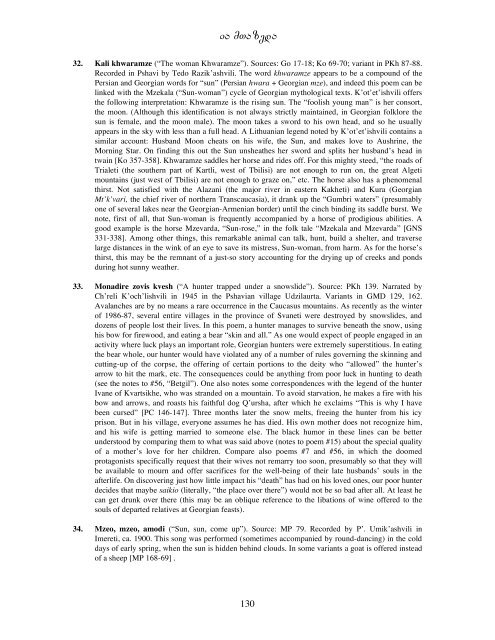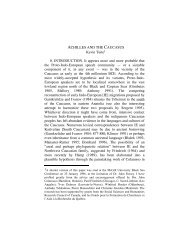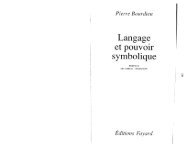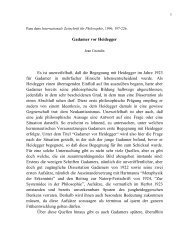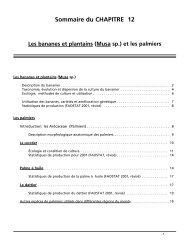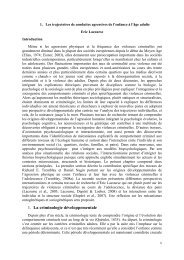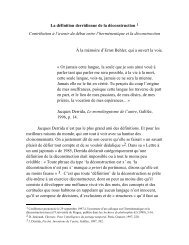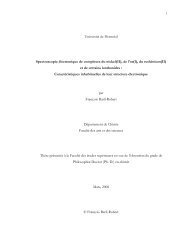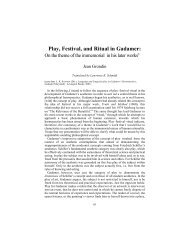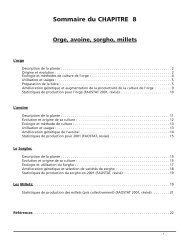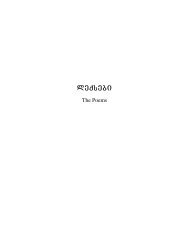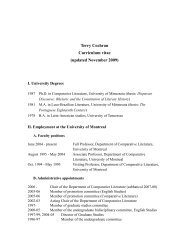Create successful ePaper yourself
Turn your PDF publications into a flip-book with our unique Google optimized e-Paper software.
ia mtazeda<br />
32. Kali khwaramze (“The woman Khwaramze”). Sources: Go 17-18; Ko 69-70; variant in PKh 87-88.<br />
Recorded in Pshavi by Tedo Razik’ashvili. The word khwaramze appears to be a compound of the<br />
Persian and Georgian words for “sun” (Persian hwara + Georgian mze), and indeed this poem can be<br />
linked with the Mzekala (“Sun-woman”) cycle of Georgian mythological texts. K’ot’et’ishvili offers<br />
the following interpretation: Khwaramze is the rising sun. The “foolish young man” is her consort,<br />
the moon. (Although this identification is not always strictly maintained, in Georgian folklore the<br />
sun is female, and the moon male). The moon takes a sword to his own head, and so he usually<br />
appears in the sky with less than a full head. A Lithuanian legend noted by K’ot’et’ishvili contains a<br />
similar account: Husband Moon cheats on his wife, the Sun, and makes love to Aushrine, the<br />
Morning Star. On finding this out the Sun unsheathes her sword and splits her husband’s head in<br />
twain [Ko 357-358]. Khwaramze saddles her horse and rides off. For this mighty steed, “the roads of<br />
Trialeti (the southern part of Kartli, west of Tbilisi) are not enough to run on, the great Algeti<br />
mountains (just west of Tbilisi) are not enough to graze on,” etc. The horse also has a phenomenal<br />
thirst. Not satisfied with the Alazani (the major river in eastern Kakheti) and Kura (Georgian<br />
Mt’k’vari, the chief river of northern Transcaucasia), it drank up the “Gumbri waters” (presumably<br />
one of several lakes near the Georgian-Armenian border) until the cinch binding its saddle burst. We<br />
note, first of all, that Sun-woman is frequently accompanied by a horse of prodigious abilities. A<br />
good example is the horse Mzevarda, “Sun-rose,” in the folk tale “Mzekala and Mzevarda” [GNS<br />
331-338]. Among other things, this remarkable animal can talk, hunt, build a shelter, and traverse<br />
large distances in the wink of an eye to save its mistress, Sun-woman, from harm. As for the horse’s<br />
thirst, this may be the remnant of a just-so story accounting for the drying up of creeks and ponds<br />
during hot sunny weather.<br />
33. Monadire zovis kvesh (“A hunter trapped under a snowslide”). Source: PKh 139. Narrated by<br />
Ch’reli K’och’lishvili in 1945 in the Pshavian village Udzilaurta. Variants in GMD 129, 162.<br />
Avalanches are by no means a rare occurrence in the Caucasus mountains. As recently as the winter<br />
of 1986-87, several entire villages in the province of Svaneti were destroyed by snowslides, and<br />
dozens of people lost their lives. In this poem, a hunter manages to survive beneath the snow, using<br />
his bow for firewood, and eating a bear “skin and all.” As one would expect of people engaged in an<br />
activity where luck plays an important role, Georgian hunters were extremely superstitious. In eating<br />
the bear whole, our hunter would have violated any of a number of rules governing the skinning and<br />
cutting-up of the corpse, the offering of certain portions to the deity who “allowed” the hunter’s<br />
arrow to hit the mark, etc. The consequences could be anything from poor luck in hunting to death<br />
(see the notes to #56, “Betgil”). One also notes some correspondences with the legend of the hunter<br />
Ivane of Kvartsikhe, who was stranded on a mountain. To avoid starvation, he makes a fire with his<br />
bow and arrows, and roasts his faithful dog Q’ursha, after which he exclaims “This is why I have<br />
been cursed” [PC 146-147]. Three months later the snow melts, freeing the hunter from his icy<br />
prison. But in his village, everyone assumes he has died. His own mother does not recognize him,<br />
and his wife is getting married to someone else. The black humor in these lines can be better<br />
understood by comparing them to what was said above (notes to poem #15) about the special quality<br />
of a mother’s love for her children. Compare also poems #7 and #56, in which the doomed<br />
protagonists specifically request that their wives not remarry too soon, presumably so that they will<br />
be available to mourn and offer sacrifices for the well-being of their late husbands’ souls in the<br />
afterlife. On discovering just how little impact his “death” has had on his loved ones, our poor hunter<br />
decides that maybe saikio (literally, “the place over there”) would not be so bad after all. At least he<br />
can get drunk over there (this may be an oblique reference to the libations of wine offered to the<br />
souls of departed relatives at Georgian feasts).<br />
34. Mzeo, mzeo, amodi (“Sun, sun, come up”). Source: MP 79. Recorded by P’. Umik’ashvili in<br />
Imereti, ca. 1900. This song was performed (sometimes accompanied by round-dancing) in the cold<br />
days of early spring, when the sun is hidden behind clouds. In some variants a goat is offered instead<br />
of a sheep [MP 168-69] .<br />
130


